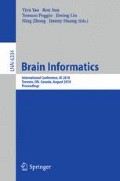Abstract
fMRI and ERP/EEG are two different sources for scanning the brain for building mind state decoders. fMRI produces accurate images but it is expensive and cumbersome. ERP/EEG is cheaper and potentially wearable but it gives more coarse-grain data. Recently the metaphor between machines and brains has been introduced in the context of mind state decoders: the “readers for machines’ thoughts”. This metaphor gives the possibility for comparing mind state decoder methods in a more controlled setting.
In this paper, we compare the fMRI and ERP/EEG in the context of building “readers for machines’ thoughts”. We want assess if the cheaper ERP/EEG can be competitive with fMRI models for building decoders for mind states. Experiments show that accuracy of “readers” based on ERP/EEG-like data are considerably lower than the one of those based on fMRI-like images.
Access this chapter
Tax calculation will be finalised at checkout
Purchases are for personal use only
Preview
Unable to display preview. Download preview PDF.
References
Vapnik, V.: The Nature of Statistical Learning Theory. Springer, Heidelberg (1995)
Norman, K., Polyn, S., Detre, G., Haxby, J.: Beyond mind-reading: multi-voxel pattern analysis of fmri data. Trends in Cognitive Sciences 10(9), 424–430 (2006)
Haxby, J.V., Gobbini, M.I., Furey, M.L., Ishai, A., Schouten, J.L., Pietrini, P.: Distributed and overlapping representations of faces and objects in ventral temporal cortex. Science 293(5539), 2425–2430 (2001)
Mitchell, T.M., Hutchinson, R., Niculescu, R.S., Pereira, F., Wang, X., Just, M., Newman, S.: Learning to decode cognitive states from brain images. Mach. Learn. 57(1-2), 145–175 (2004)
Xiang, J., Chen, J., Zhou, H., Qin, Y., Li, K., Zhong, N.: Using svm to predict high-level cognition from fmri data: A case study of 4*4 sudoku solving. In: Zhong, N., Li, K., Lu, S., Chen, L. (eds.) BI 2009. LNCS, vol. 5819, pp. 171–181. Springer, Heidelberg (2009)
Mitchell, T.M., Shinkareva, S.V., Carlson, A., Chang, K.M., Malave, V.L., Mason, R.A., Just, M.A.: Predicting human brain activity associated with the meanings of nouns. Science 320(5880), 1191–1195 (2008)
Kiefer, M.: Perceptual and semantic sources of category-specific effects: Event-related potentials during picture and word categorization. Memory & Cognition 29(1), 100–116 (2001)
Paz-Caballero, D., Cuetos, F., Dobarro, A.: Electrophysiological evidence for a natural/artifactual dissociation. Brain Research 1067(1), 189–200 (2006)
Murphy, B., Baroni, M., Poesio, M.: EEG responds to conceptual stimuli and corpus semantics. In: Proceedings of the 2009 Conference on Empirical Methods in Natural Language Processing, Singapore, pp. 619–627. Association for Computational Linguistics (August 2009)
Tucker, D.M.: Spatial sampling of head electrical fields: the geodesic sensor net. Electroencephalography and Clinical Neurophysiology 87(3), 154–163 (1993)
Zanzotto, F.M., Croce, D.: Reading what machines “think”. In: Zhong, N., Li, K., Lu, S., Chen, L. (eds.) BI 2009. LNCS, vol. 5819, pp. 159–170. Springer, Heidelberg (2009)
Alvarado, P., Doerfler, P., Wickel, J.: Axon2 - a visual object recognition system for non-rigid objects. In: IASTED International Conference-Signal Processing, Pattern Recognition and Applications (SPPRA), Rhodes, pp. 235–240. IASTED (July 2001)
Alvarado, P., Doerfler, P.: LTI-Lib - A C++ Open Source Computer Vision Library. In: Kraiss, K.F. (ed.) Advanced Man-Machine Interaction. Fundamentals and Implementation, pp. 399–421. Springer, Dordrecht (2006)
Quinlan, J.: C4:5:programs for Machine Learning. Morgan Kaufmann, San Mateo (1993)
John, G.H., Langley, P.: Estimating continuous distributions in bayesian classifiers, pp. 338–345 (1995)
Aha, D.W., Kibler, D., Albert, M.K.: Instance-based learning algorithms. Mach. Learn. 6(1), 37–66 (1991)
Witten, I.H., Frank, E.: Data Mining: Practical Machine Learning Tools and Techniques with Java Implementations. Morgan Kaufmann, Chicago (1999)
Author information
Authors and Affiliations
Editor information
Editors and Affiliations
Rights and permissions
Copyright information
© 2010 Springer-Verlag Berlin Heidelberg
About this paper
Cite this paper
Zanzotto, F.M., Croce, D. (2010). Comparing EEG/ERP-Like and fMRI-Like Techniques for Reading Machine Thoughts. In: Yao, Y., Sun, R., Poggio, T., Liu, J., Zhong, N., Huang, J. (eds) Brain Informatics. BI 2010. Lecture Notes in Computer Science(), vol 6334. Springer, Berlin, Heidelberg. https://doi.org/10.1007/978-3-642-15314-3_13
Download citation
DOI: https://doi.org/10.1007/978-3-642-15314-3_13
Publisher Name: Springer, Berlin, Heidelberg
Print ISBN: 978-3-642-15313-6
Online ISBN: 978-3-642-15314-3
eBook Packages: Computer ScienceComputer Science (R0)

